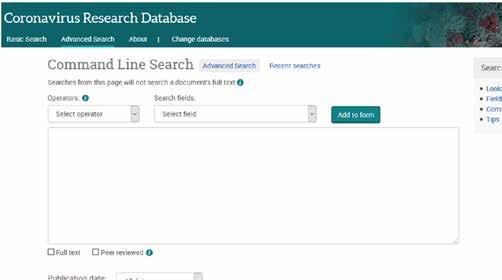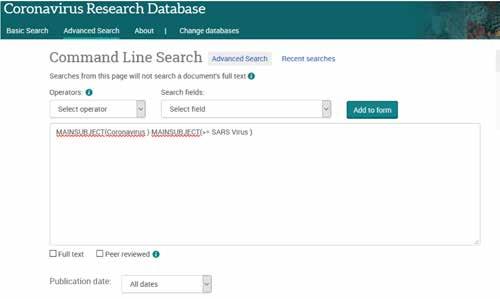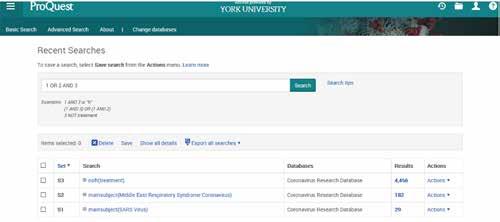
10 minute read
ProQuest Coronavirus Research Database
doi:10.5260/chara.22.2.43 Date of Review: September 10, 2020
Composite Score: HHHH
Reviewed by:
Marcia Salmon York University, Toronto, Ontario, Canada <msalmon@yorku.ca>
Abstract Coronavirus Research Database is created and maintained by ProQuest. It is freely available to existing ProQuest customers and is an authoritative source of information on Coronavirus Disease pandemic (Covid-19) and past coronavirus epidemics such as Severe Acute Respiratory Syndrome (SARS) and Middle East Respiratory Syndrome (MERS). It has a robust search engine and a clean user interface. ProQuest Coronavirus Research Database has become a reputable and reliable research source for coronavirus research and the virus’s impact on public health.
Price ProQuest Coronavirus Research Database is available at no cost to existing ProQuest customers (ProQuest, 2020). This research database is made available at no cost by the International Association of Scientific, Technical and Medical (STM) Publishers such as Springer/ Nature, BMJ, and Taylor and Francis (ProQuest, 2020). There is no cost to searching this database for existing ProQuest customers however, accessing the full text of some of the content may require a subscription to that publication.
Product Overview and Description Coronavirus Research Database is created and maintained by ProQuest, an American information content and technology company. This research database is an authoritative resource for information on coronavirus outbreaks because it contains a curated collection of journal articles, preprints, conference proceedings, dissertations, and resources related to Covid-19 as well as other related infectious diseases (ProQuest, 2020). The Coronavirus Research Database includes comprehensive research background coverage of past pandemics and epidemics, like Severe Acute Respiratory Syndrome (SARS) and Middle East Respiratory Syndrome (MERS), to give researchers and students context around the current global crisis (ProQuest, 2020).
The content in the ProQuest Coronavirus Research Database includes journal articles from the International Association of Scientific, Technical and Medical (STM) Publishers such as Springer/Nature, BMJ, and Taylor and Francis (ProQuest, 2020). It also includes selected content from leading medical journals such as Lancet, New England Journal of Medicine, JAMA, PLoS One, Virology Journal, and Journal of Travel Medicine. In addition to including content from Open Access repositories such as arXiv, conference proceedings and dissertations (ProQuest, 2020).
ProQuest has voluntary product accessibility template conformance reports and general accessibility statements for many of their information products and databases but not the Coronavirus Research Databases (ProQuest, 2020).
User Interface and Searching The user interface for ProQuest Coronavirus Research Database includes both a basic search interface (see Figure 1) and an advanced search interface (see Figure 2). The basic search function for the ProQuest Coronavirus Research Database has a very simple search box that allows for searching by key words. In the basic search function, the key words may be only searched in the abstract/details of the resource, if the full text box is not selected. The abstract/details of the resource includes the following fields: Abstract, Identifier/Keyword, Title, Author, Publication Title, Publication Year, Publication Date, Publisher, Place of Publication, Country of Publication, Source Type, Language of Publication, Document Type, Publication History, Digital Object Identifier (DOI), ProQuest Document Identifier, Document URL, Copyright, Last Updated, and Database.
FIGURE 1 Basic Search Interface in ProQuest Coronavirus Research Database
FIGURE 2 Advanced Search Interface in ProQuest Coronavirus Research Database

FIGURE 3 Basic Search for Covid-19 Treatment

FIGURE 4 Basic Search Results for Covid-19 Treatment

If the full text box is selected in the basic search function, key words are searched in the full text of the article. There is also a peer review box that may be selected in the basic search function. If the Peer Review box is selected, only peer reviewed publications will be available in the search results. ProQuest Coronavirus Research Database allows for Boolean searching. The Boolean operators that are supported in the basic search are: AND, OR, and NOT. The operator AND search results contain all the key words; the Boolean operator OR search results contain either keywords, while the operator NOT is used to exclude key words such as “influenza pandemics” NOT Covid-19. The use of quotations provides exact phrase searching. The use of the question mark (?) for truncation indicates that it searches plural versions of the search word such as treatment and treatments. Figures 3 and 4 show an example of basic search for “Covid-19 treatment” and the search results. The advanced search function allows keyword searching in the following fields: anywhere, anywhere except full text, abstract, all subjects and indexing, subject heading, company/organization, location, person, product, author, document text, document title, publication title, image caption, North American Industry Classification System (NAICS) code, and section. ProQuest Coronavirus Research Database uses both Medical Subject Headings (MeSH) and an internally created controlled vocabulary for subject access. The advanced search function (see Figure 2) has Boolean searching (AND, OR, and NOT) integrated into the search interface. The Boolean proximity operators such as NEAR and PRE may also be used in the advanced search interface. The Boolean proximity operator NEAR (Actual number of words apart), indicates that the search terms must be within the specified number of words apart in any order; for example, Covid-19 NEAR/3 Coronavirus. The proximity operator PRE (Actual


Number of words apart), indicates that the first search term must be before the second search term within the specified number of words. Therefore, the Boolean proximity operator PRE indicates the order of the search terms, however for the proximity operator NEAR, order is not relevant (ProQuest, 2020). The advanced search interface includes search limits. Like the basic search, advanced search includes limits for Full Text and Peer Review. In addition, the advanced search includes limits by Publication Date, Source Type, Document Type, Language, and Creative Common Licenses. Figure 5 shows an advanced search for “Covid-19 NEAR/3 Coronavirus” AND “Pandemic” limited to English only resources. In addition to basic and advanced search the ProQuest Coronavirus Research Database also has a Command line search option (see Figure 6). This allows sophisticated searching by specifying the specific field and using Boolean operators (AND, OR, and NOT); proximity operators (NEAR and PRE) and operators (=, >, <, =>, >=) to connect multiple search terms. Figure 7 shows a search for Coronavirus >= SARS Virus. The command line searching also has search limits like the basic and advanced search; the search results can be limited by Full Text and Peer Review, as well as Publication Date. Sorting search results by relevance, oldest first, and most recent first are also available in the command line search interface. The command line search also has the following features: specifying the number
FIGURE 5 Advanced Search for Covid-19, Coronavirus and Pandemic English Resources
FIGURE 6 Command Line
Search Interface
of search results on a page, excluding duplicate documents, spelling variants of search terms, form variants of search terms and show variants on the results page.
The recent search interface allows combining search results using Boolean operators (AND, OR, and NOT), see Figure 8. This search interface permits the saving of searches if you have ProQuest account and exporting the search results in various formats.
Critical Evaluation
CONTENT
ProQuest Coronavirus Research Database is an authoritative source of information on outbreaks of coronavirus diseases such as Covid-19, Severe Acute Respiratory Syndrome (SARS), and Middle East Respiratory Syndrome (MERS). This research database contains a curated collection of journal articles, preprints, conference proceedings, dissertations from reputable biomedical journal publishers and preprint repositories. Whereas ProQuest Coronavirus Research Database is an authoritative database, there are some weaknesses. Although this database includes gray literature such as conference proceedings, preprints and dissertations, a weakness is the lack of government documents on coronavirus diseases. Therefore, ProQuest Coronavirus Research Database does not contain a comprehensive collection of gray literature. Another weakness is that the ProQuest Coronavirus
FIGURE 7 Command Line Search for Coronavirus, SARS Virus

FIGURE 8 Combining Searches in the Recent Search Interface

Research Database also does not have voluntary product accessibility conformance reports and general accessibility statements provided by ProQuest. There is also no availability to request alternative formats of content in the database.
USER INTERFACE AND SEARCHING
The user interface of the ProQuest Coronavirus Research Database is clean, intuitive and user friendly. However, the impressive part of this database is the searching capabilities. This database offers a search interface that meets the needs of users ranging from the novice to expert searcher. The Basic search features a simple search box that allows using Boolean Operators and simple search limits for the novice searcher to the Command line search interface that allows for the use of more complex operators such as Boolean and proximity operators for the expert searcher. The Command line search has the ability to include spelling variants of search terms. The recent search function permits combining searches to create complex search strategies that may be saved or exported. The advanced and command line search may be used to search specific fields. ProQuest Coronavirus Research Databases also includes the ability to use Medical Subject Headings (MeSH) and a local controlled vocabulary for subject indexing. Competitive Products There does not appear to be a single database that competes directly ProQuest Coronavirus Research Database. However, there are several
Free Text Keywords: public health | infectious diseases | Coronavirus | Severe Acute Respiratory Syndrome | Middle Eastern Respiratory Syndrome | Coronavirus Disease 2019
Primary Category: Public Health
Secondary Categories: Disaster Medicine; Multidisciplinary (or interdisciplinary)
Type of Product being Reviewed: Abstract index database; Aggregator database; Discovery tool; Library tool; Website
Target Audience: Epidemiologists; Public Health Professionals; Researchers; Faculty; Graduate Students
Review Scores Composite: HHHH
The maximum number of stars in each category is 5. Content: HHH This database contains biomedical journal literature, conference proceedings, dissertations and open access content from preprint repositories that are related to outbreaks of coronavirus diseases such as SARS, MERS, and Covid-19. The Coronavirus Research Database does not have accessibility compliance and does not contain a comprehensive collection of gray literature. There is also no availability to request alternative formats of content in this database.
Searchability: HHHHH Search interface is clean. The database has four different search interfaces: basic, advanced, command line, and recent searches. The different interfaces provide searching for novice and expert searchers. Boolean, proximity, and truncation searching are enabled in all search interfaces. ProQuest Coronavirus Research Database uses an internal controlled vocabulary and MeSH. Search limits and sorting search results are available in the advanced and command line search interface. Resent search interface allows the combining, saving and export of searches.
Price: N/A ProQuest Coronavirus Research Database is free for ProQuest customers. However, subscription cost may be required to access full text of some publications.
Contract Provisions: N/A ProQuest provides access to the Coronavirus Research Database for free with subscription to other ProQuest databases.
Contact Information
ProQuest
789 E. Eisenhower Pkwy. Ann Arbor, MI 48104 Phone: (800) 521-0600 E-mail: <customerservice@ProQuest.com> Producer URL: <https://support.ProQuest.com/>
databases that cover various aspects of the content such as PubMed and PubMed Central index journal literature on virology, coronavirus diseases, and pandemic influenza. It should be noted that although Google Scholar is primarily a search engine it also indexes journal articles on Covid-19 and related coronavirus diseases. Disaster Lit: Database for Disaster Medicine and Public Health created by the U.S. National Library of Medicine also has some overlap of content regarding public health outbreaks such as Severe Acute Respiratory Syndrome (SARS), Middle Eastern Respiratory Syndrome (MERS), and Covid-19.
Contract Provisions The ProQuest Coronavirus Research Database is free with a subscription to other ProQuest databases (ProQuest, 2020). There is no cost for searching this database for existing ProQuest customers; however, accessing the full text of some of the content may require a subscription to that publication.
Authentication Authentication for this database supports a variety of methods including proxy service, IP address, username/password, and Shibboleth. Author’s References PR Newswire. “Coronavirus Research Database Gives ProQuest Users No-Cost Access to Essential Coverage of COVID-19 and More”. PR Newswire 2020. <https://www.prnewswire.com/news-releases/ coronavirus-research-database-gives-ProQuest-users-no-cost-access-to-essential-coverage-of-covid-19-and-more-301032680.html>. Viewed August 17, 2020. ProQuest. “ProQuest Accessibility”. ProQuest 2020. <https://about. ProQuest.com/company/ProQuest-ADA-Compliance.html>. Viewed August 17, 2020. ProQuest. “Coronavirus Research Database”. ProQuest 2020. <https://search.ProQuest.com/coronavirus?accountid=15182>. Viewed August 17, 2020. ProQuest. “Coronavirus Research Database Gives ProQuest Users No-Cost Access to Essential Coverage of COVID-19 and More”. ProQuest 2020. <https://about.ProQuest.com/about/news/2020/Coronavirus-Research-Database-Gives-ProQuest-Users-No-Cost-Access. html>. Viewed August 17, 2020. ProQuest. “Novel Coronavirus (COVID-19): Authoritative and Relevant Resources”. ProQuest 2020. <https://about.ProQuest.com/products-services/related/Coronavirus-Outbreak-Authoritative-Resources.html>. Viewed August 17, 2020.
About the Author
Marcia Salmon is a Digital Scholarship Metadata Librarian and is an active member of the Health, Sciences and Engineering Disciplinary Cluster at the Scott Library at York University in Toronto Canada. She received an honours B.Sc. in Biology and Applied Educational Psychology from University of Toronto, and a MLIS (Master of Library and Information Science) from Western University, Ontario. n









